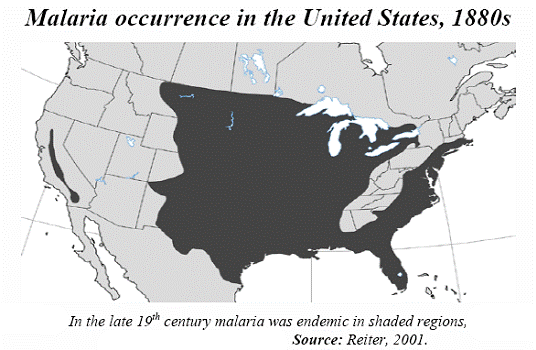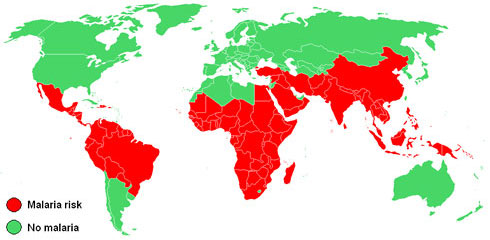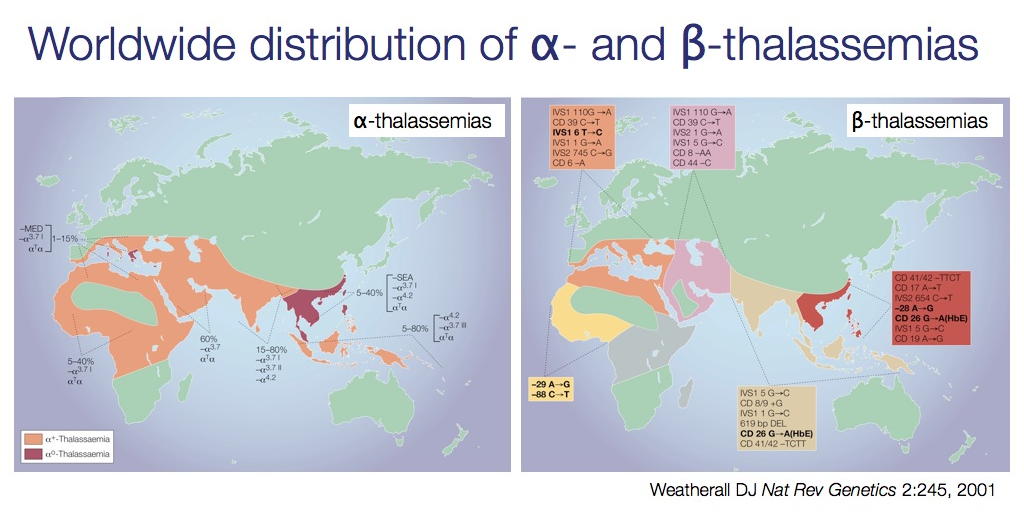Thalassemia minor: ain’t heredity grand?
Years ago when I was in college, I took a class where I learned about sickle cell anemia and sickle cell trait, as well as thalassemia major and minor.
They seemed awesome examples of the way heredity works: inherited defects of red blood cells in which, if two genes for the flaw are inherited, the person is very ill (fatally so before modern medicine), but inheriting only one gene for the trait confers the benefit of increased resistance to malaria. That was very important in the many areas around the world where the disease was endemic, because people with the single-gene traits had a leg up for survival. Thus the mutations for sickle cell and thalassemia persisted and even flourished, despite the fact that the double-gene diseases were invariably fatal.
What’s this got to do with anything? When I was in my 30s, a doctor noticed some mild abnormalities in my blood results, and after some specialized testing he told me that I had thalassemia minor, which is the trait rather than the disease. Blood tests show a mild anemia-like pattern, and under the microscope some red blood cells are seen to be oddly shaped and smaller than usual.
Then a couple of years ago, my son surprised me by saying he’d had some weird blood tests results, too, but that he had told the doctor that his mother had thalassemia minor and asked whether this could be the same thing. Yes, indeed, said the doctor; his blood test results fit that pattern exactly.
And so they did. When I looked back at my old blood tests and compared them to my son’s new ones, their slightly-off figures were nearly identical—slightly off in the same direction and to exactly the same degree.
Then I got curious. I had never really thought about it much before, but of course if I had the trait one of my parents almost certainly had had it, too (unless I had a very rare spontaneous mutation). My father’s blood tests are lost in the mists of time, since he died over thirty years ago. But my mother—98 when I started thinking about the question—still had tons of previous blood test reports in her files. And sure enough, when I got hold of her numbers, they were virtually the same as those of my son and me—although no doctor had ever noticed the abnormalities or mentioned a possible thalassemia minor diagnosis to her.
It doesn’t matter much, unless a person marries another person with the gene and runs the risk of having children with the disease rather than just the trait. The single-gene trait doesn’t really affect people, although some claim it makes them a little tired because their hemoglobin isn’t what it should be. Actually, the body tends to compensate for the smaller size and strange shape of the red blood cells by increasing their number slightly, which is what all three of us in my family seem to have done. But there’s something about the figures and their almost exact correspondence to each other across all three generations that made me stop in wonderment at the beauty of both heredity and of science itself, which can study, understand (at least to some extent), and document such a thing.
NOTE: Here’s where malaria still exists today, although its distribution used to be much wider:
Malaria in the US in the 1880s:

And here’s the distribution of thalassemia:
The distribution of thalessemia:



Most people don’t realize that malaria was endemic from the equator to the arctic. When Peter the Great built Saint Petersburg thousands of workers perished from malaria.
Thalassemia, the word, comes from the Greek, Thalassa, meaning “sea.” ( The Mediterranean Sea in this case. ) I’m guessing that your mother descends from a Mediterranean people, perhaps Greek, or Italian. Am I right?
More to blood than a name. More too, than science. Something I… take to heart as I consider sharing heart juice. For some, a blind gamble, for others, a more strongly considered thing, of science, nature, spirit, or politics. Or… not.
Unless you are a historical nut, it probably has passed out of memory that malaria was endemic across a wide stretch of the US – in the coastal lowlands and in the Mississippi-Missouri basin, throughout Texas (full of standing water and blessed by relatively mild temperatures.) Just recently, doing research for the next book I read an account of an Army base in the New Mexico Territory – Fort Thorn, which pre-Civil War was supposed to be the unhealthiest post in the far West. There were swamps and lagoons in the river-bottoms thereabouts, and it seems that the first detachments of US troops assigned there had soldiers among them afflicted with malaria, which they had contracted through service in Mexico during the Mexican-American war. Supposedly, the local mosquitos bit the afflicted troopers, and so the disease was spread. (If it hadn’t already been there before.)
In Little House on the Prairie, the whole Ingalls family came down with it – incapacitated, completely, three decades later. Only Laura was able to get out of bed briefly, to crawl to the water jug to get a dipper of water. The family was eventually tended by a black doctor, who had a contract with the federal government to treat the local reservation Indians, IIRC. A whole family bedridden all at once – what a horror.
This may also be why your body thinks milk is poison and why diets designed for the average human doesn’t work on you.
Thalassemia is very frequent (1 in 5 or 7 persons are carriers) among Sephardic and Mizrahi Jews, but rare among Ashkenazi Jews. Probably, Neo, you have some Sephardic ancestry.
Indeed, heredity might be grand.
However, modern medicine and science needs to be lauded as well.
The ability to look within you and determine traits and potential dangers. Giving you the ‘head’s up’ so that you might be better prepared for what life throws at you and your relatives.
It is worthy of prayerful thanks.
Be well and thank you for sharing your story which extolls the benefits of “listening” and “watching” and “knowing”.
Be ever curious in life as you will feed y
I saw this post briefly the other day, and wanted to come back and leave a comment before I had forgotten.
When I was a child, our next door neighbors’ daughter, one of two, and the one a couple years older than myself, suffered from what I recall as Cooley’s Anemia. A “Mediterranean anemia”
There was a foundation I think – I am not sure what exactly – they were involved with, and some kind of more than usual relationship with Children’s’ Hospital.
It’s my recollection that it was then, say ’62 or 3, considered a very rare disease or malady, which had only received significant attention since about the early/mid fifties; basically about the time she was born.
She must have had a fairly serious case, because by the time she was 6 or 7 she was showing serious growth problems, and I recall that at some point the poor kid’s spleen enlarged to the extent that she looked something like a pregnant child.
Perhaps, because the entire neighborhood of near identical 1955 built 3 bedroom red brick ranches was inhabited by uniformly youngish couples with multiple kid families all starting out at the same time, and because we neighborhood kids had all developed from toddler age practically living in each others houses, it was more like having a semi-sister who you just accepted had problems, than anything as unusual as her case might otherwise have seemed to outsiders. She lived among a dozen families who just accepted her as she was and knew her story.
But the pain she suffered and the burden her parents bore, were obviously theirs alone. I can recall even now hearing of the endless trips for transfusions, and the hospitalizations. The financial strain they endured was obvious. What must have been a crushing private despair as she approached the age of puberty, but remained child sized and frail was there for anyone who might have had the courage to consider it. How they all managed, I do not now, in retrospect, know.
Josie’s parents were 1st generation American born, Sicilian Catholics, and it’s possible that strong faith and family ties helped them cope. Some memory of their [the two kid’s] interest in saints, and Fatima and I think the strange stories of Garabandal lingers.
More strongly, I recall the girls collecting for the Jerry Lewis telethon and a neighborhood fair they arranged for whatever that Danny Thomas affiliated hospital was.
Unsurprisingly, the younger daughter went into medicine, and married a doctor.
I pretty much lost track of their lives after we moved further out from the “Shores” when I was about 11; but when I attended her funeral some 25 or more years later, I learned that she had been active in foundational or support group work for most of her adult life – inasmuch as her health would permit. Her death was not easy, he sister said.
Requiesce in pace, Josephine.
Hey, I’ve got that, too! I’m pretty sure it came from my mother’s side of the family who had some French ancestors. The only symptom I experienced was delayed puberty; I didn’t grow pubic hair until I was 18 y.o., which was always kind of embarrassing in the locker room. That symptom may apply to your sons.
I work with top geneticists… like Shadt… also on minerva… in the research computing area…
Neo: if I had the trait one of my parents almost certainly had had it, too (unless I had a very rare spontaneous mutation).
actually not so rare given the mutation has over 20 SNP variations, and without a DNA test you would not know which ones.
see: http://www.snpedia.com/index.php/Rs33915217
i have done some interesting but invisable work. one thing i showed my genetics friend was a DATA based explanation for codon expansion… which matched the extremophile research done with heat sensitivity.
but another, which i discussed with the geneticist, but only got minor traction, is that many SNPs have no choice but to exist given that the amino acid that gets mixed up, has fewer equivalent outcomes.
that is, if you do a bit of looking at the data, you may notice what i did, which is where i did a whole lot more research. i wrote software to look at single change forward results. that is, coding to see how many of the common conditions were caused by SNP in letter combinations in which a change would lead to a non equivalent outcome. very interesting work, and it jibed with lots of conditions in that the needed amino acid has only one or two ways to be coded, while other amino acids had many ways, and so an error was less critical as it often would result in the same outcome even if a different letter was in place.
ultimately the point was that in some proteins and other points, the amino acid needed HAS to be one of the newer coding additions and so was much more sensitive to SNP outcomes.
but i am a nobody waiting to die…
so its irrelevent… as is all my work
snopercod:
No delayed puberty here. Fairly early puberty, actually. The only symptom I’ve ever heard related to thalassemia trait (and tenuously related, at that) is slight tiredness.
That reminds me of something.
http://econlog.econlib.org/archives/2015/01/shy_male_nerds.html
A lot of Art’s negative reactions to feminists would make sense, as some of it tends to be directed at Neo’s writings about various such issues.
Specifically: SMNs should exclude hostile feminists from their Bubble. (Further background). Stop arguing with hostile feminists. Stop reading them. If you know any in real life, stop associating with them. Even if they have halfway decent reasons for berating you, you’re clearly not right for each other.
Since Art doesn’t want to lose his pension and thus refuses to change his work/social sphere, and doesn’t particularly want to change himself in terms of social skills, some Leftists and feminists may consider that an easy target. Low hanging fruit.